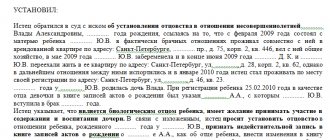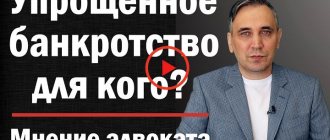ST 21 of the Criminal Code of the Russian Federation.
1. 1. A person who, at the time of committing a socially dangerous act, was in a state of insanity, that is, could not realize the actual nature and social danger of his actions (inaction) or control them due to a chronic mental disorder, temporary mental disorder, dementia, is not subject to criminal liability. or other painful mental state.
2. A person who has committed a socially dangerous act provided for by criminal law in a state of insanity may be imposed by a court with compulsory medical measures provided for by this Code.
Commentary to Art. 21 Criminal Code
1. The presence of a person in a state of sanity at the time of committing a crime is the third mandatory characteristic of a subject. In criminal law, sanity is defined negatively - through the disclosure of the opposite concept of insanity.
In criminal law, there is a presumption of sanity, according to which a person is presumed sane until the contrary is proven. The presumption is therefore rebuttable.
Insanity is revealed through a combination of three legally significant criteria of insanity.
2. The medical criterion of insanity presupposes the presence of a chronic mental disorder, temporary mental disorder, dementia or other painful mental state in a person.
The legal criterion of insanity is related to the fact that the disease affects a person’s behavior, i.e. due to an existing illness, a person could not realize the actual nature and social danger of his actions (inaction) (intellectual version of the criterion) or alternatively manage them (volitional version of the criterion). Attention should be paid to the degree of expression of the legal criterion: a person must be completely deprived of the ability to realize the actual nature and social danger of his actions (inaction) or to manage them.
The temporal criterion of insanity is contained in the words “during the commission of a socially dangerous act.” The state of insanity is established in connection with a specific act imputed to the person; a person who was in a state of sanity at the time of committing a crime, but subsequently fell ill with a mental disorder, depriving him of the ability to realize the actual nature and social danger of his actions (inaction) or to direct them, is subject to release from punishment (Article 81 of the Criminal Code) and, in the event of recovery, may subsequently incur criminal liability for a previously committed crime.
3. A person who has committed a socially dangerous act in a state of insanity is not the subject of a crime; what he did is not considered a crime. The legal consequences of insanity are provided for in Part 2 of the Article and Chapter 15 of the Criminal Code.
Sanity and insanity. Russian criminal legislation does not define sanity
Russian criminal law does not define sanity. In Art. 21 of the Criminal Code of the Russian Federation contains the concept of insanity, thereby the criminal law reveals the concept of sanity through insanity, that is, in a negative way[84].
Sanity is the ability of a person, during the commission of a crime, to realize the actual nature and social danger of his actions and to direct them[85].
The Criminal Code distinguishes between general insanity and age-related .
The concept of general insanity is disclosed in Part 1 of Art. 21 of the Criminal Code of the Russian Federation: “A person who, at the time of committing a socially dangerous act, was in a state of insanity, that is, could not realize the actual nature and social danger of his actions (inaction) or direct them due to a chronic mental disorder, temporary mental disorder, is not subject to criminal liability. dementia or other painful mental state.”
The concept of insanity, formulated by law, includes two criteria (conditions), the totality of which characterizes the insanity of a person:
— legal (psychological);
- medical (biological).
The legal criterion of insanity is that the person committing a dangerous act cannot be aware of or control his behavior due to a painful mental state. Therefore, the legal criterion of insanity includes two elements:
a) the ability to realize the actual nature and social danger of one’s act - the intellectual element;
b) direct one’s actions (inaction) – a volitional element.
The law names the following as medical criteria for insanity:
a) chronic mental disorder;
b) temporary mental disorder;
c) dementia;
d) another painful mental state.
chronic mental disorders to be those mental illnesses that “last for a long time, under the influence of treatment or for other reasons do not go away or do not go away completely.” These include schizophrenia, epilepsy, progressive paralysis, some forms of psychoses resulting from organic brain damage, and other diseases with long-term treatment.
A temporary mental disorder is characterized by a sudden onset and short-term course. It occurs mostly in people who normally show no deviations from the norm. An example of a temporary disorder of mental activity is a reactive state, delirium tremens, pathological affect.
Dementia,
that is, persistent congenital underdevelopment of mental abilities or the same persistent and irreversible decrease in intelligence as a result of destructive changes in the brain after injuries, infectious and other diseases. It manifests itself in a decrease in predominantly cognitive activity and weakness of judgment. Dementia (mental retardation) is divided into three types according to its degree:
— deep (idiocy);
- average (imbecility);
- lung (debility).
Other painful conditions include various psychopathy, neuroses, and mental changes as a result of deaf-muteness.
Only a combination of medical and legal criteria provides grounds for declaring a person insane.
the content of age-related insanity in Part 3 of Art. 20 of the Criminal Code of the Russian Federation: “If a minor has reached the age specified in parts one or two of this article, but due to mental retardation not associated with a mental disorder, during the commission of a socially dangerous act he could not fully understand the actual nature and social danger of his actions (inaction) or direct them, he is not subject to criminal liability.”
Criteria (conditions) of age-related insanity:
1. Legal - a minor could not fully understand the actual nature and social danger of his act (intellectual element) or control them (volitional element).
2. Medical – there is a delay in mental development that is not associated with a mental disorder.
Clarification of these circumstances requires a very qualified approach to the identity of the minor and, if necessary, an examination.
Sanity and insanity are not medical, but legal concepts. Therefore, a conclusion about the sanity and insanity of a person in a particular case is made not by a forensic psychiatric examination, but by investigative authorities and the court. But the prosecutor, investigator, person conducting the inquiry, or the court base this conclusion on the conclusion of a forensic psychiatric examination.
Second commentary to Art. 21 of the Criminal Code of the Russian Federation
1. Modern criminal law doctrine does not equate sanity with mental health. Health, as well as its absence, illness are relative concepts. For the criminal legal status of “subject of a crime,” what matters is not a person’s health (or lack thereof), but his quality as a subject of responsibility. Insanity is the mental status of a person established on the basis of medical and legal criteria, excluding his ability to act as a subject of a crime (to be a bearer of criminal legal status). Establishing the insanity of a person who has committed a socially dangerous act is the prerogative of the court, which makes its decision based on an assessment of the medical characteristics of the person’s mental state and its own conclusions about how this condition influenced his behavior in the circumstances of the commission of a socially dangerous act. According to this, medical (biological) and legal (psychological) criteria are distinguished, the totality of which determines insanity.
2. The medical criterion of insanity determines whether a person has a mental disorder, any of those listed in Part 1 of Art. 21 CC.
Chronic mental disorder (mental illness with a tendency to progress), leaving after acute clinical manifestations an increasing mental defect in the form of irreversible impairment of intellectual functions of an acquired nature (for example, schizophrenia, epilepsy, manic-depressive psychosis, progressive paralysis, senile psychosis and others). A temporary mental disorder is a reversible illness that can last from a few minutes to several hours and even days, in rare cases - several weeks. It ends with recovery, leaving no visible changes in mental activity (for example, exceptional and reactive states, alcoholic psychosis). Dementia is a mental disorder characterized by severe irreversibility of impairments of intellectual function, both congenital and acquired (for example, mental retardation, involutional processes). Another painful condition is a persistent disorder or anomaly in the development of the psyche, resulting from various somatic, neurological, infectious and other diseases or pathological upbringing (for example, psychopathy).
The classification and symptomatology of mental illnesses (disorders and painful conditions) belongs to the field of psychiatry. Therefore, lists of diseases related to medical signs of insanity are approved by the Decree of the Government of the Russian Federation and are used by specialists when formulating the conclusions of their expert studies.
3. Legal criterion of insanity. For a court decision on insanity, one medical criterion is not enough: according to the legislative definition, it is necessary to establish the influence of a mental disorder on the behavior of a person at the time of committing the incriminated act, i.e. assess the intellectual and volitional abilities of a person in specific legally significant circumstances. The intellectual sign of insanity means that the person was not aware of the actual nature and social danger of his act in the circumstances of its commission (for example, a mother strangles her child, believing that she is caressing him).
The volitional sign of insanity means that in the circumstances of committing a socially dangerous act, a person cannot control his actions (inaction). This symptom is typical for manic mental states, in which the intellectual sphere of mental activity is not affected, but due to a disorder of the volitional sphere, the person commits a socially dangerous act under the influence of an irresistible desire (with kleptomania, pyromania, etc.).
Third commentary to Article 21 of the Criminal Code of the Russian Federation
1. The state of insanity means a special mental state of a person that characterizes his intellect and will during the commission of a socially dangerous act recognized as a crime. The terms “insanity” and “sanity” refer to legal concepts and characterize the subject, his ability or inability to bear criminal responsibility. Therefore, when determining sanity or insanity, law enforcement officers must analyze not questions related to the subjective side, but establish data about the identity of the subject, his condition and behavior during (at the moment) of the commission of a criminal act (see: BVS RF. 2000. N 11. C . 14).
2. In accordance with Art. 21 of the Criminal Code, the state of insanity is determined by two criteria. One of them is the presence of a painful mental state in a person, which is usually called a medical (or biological) criterion. The second criterion means that a person does not have the ability to recognize the meaning of his actions or to control them. This criterion is called legal (psychological). To declare a person insane, both criteria must be established. The medical basis for making such a decision is the conclusion of a forensic psychiatric examination, but in the end only the court recognizes a person as insane (see: BVS RF. 2003. No. 4).
3. Medical criterion of insanity in Art. 21 of the Criminal Code is a generalized list of mental disorders, including four types: 1) chronic mental disorder; 2) temporary mental disorder; 3) dementia; 4) another painful mental state. From the content of the medical criterion it follows that non-painful mental disorders should not exclude sanity. A chronic mental disorder should be understood as a group of diseases that are long-term, intractable and progressive (schizophrenia, epilepsy, progressive paralysis, manic-depressive psychosis, presenile and senile psychoses, etc.). Temporary mental disorders include mental illnesses that develop quickly, last a short time and end with complete recovery. Dementia is a painful mental state that is characterized by inferiority of mental activity. Doctors distinguish oligophrenia (congenital dementia) and its three forms: mild (debility), moderate (imbecility) and severe (idiocy). Acquired dementia (dementia) is a painful condition characterized by a decrease or complete absence of mental activity and associated, as a rule, with the disease that caused it. Another painful mental state is a disorder of mental activity of a painful nature, which does not fall under the symptoms of the three categories mentioned above. This may include the most severe forms of psychopathy, mental anomalies in the deaf and mute, the consequences of traumatic brain injury (traumatic encephalopathy), etc. Any of the listed diseases or mental deficiencies individually may be sufficient to declare a person insane from the point of view of the medical criterion of insanity. In general, the modern formulation of the medical criterion of insanity covers essentially all possible variants of mental pathology.
4. The legal (psychological) criterion of insanity is characterized by two signs: intellectual (inability to realize the meaning of one’s actions) and volitional (inability to control one’s actions). To declare a person insane from the point of view of the criterion under consideration, one of these signs is sufficient. An intellectual sign indicates that the person who committed this or that action (or inaction) is not able to understand the factual circumstances of the act or cannot realize its social significance. A volitional sign of insanity consists in a person’s lack of ability to control his actions. This is an independent sign, which, even in the absence of an intellectual sign, may indicate the presence of insanity. For this reason, the law separates these two characteristics with the conjunction “or”. A person who has committed a socially dangerous act, under a certain state of mind, may, while committing such an act, retain the ability to formally assess events and understand them, but at the same time lack the ability to direct his actions. In such cases, the presence of a legal criterion of insanity can be judged on the basis of one volitional sign. On the other hand, the inability to realize one’s actions (an intellectual sign) always indicates an inability to direct these actions and, therefore, the presence of a legal (psychological) criterion of insanity.
5. By a court decision, a person declared insane may be subject to compulsory medical measures.
This means that under certain circumstances of a socially dangerous act and information about the personality of an insane person, the mentioned measures may not be applied (see commentary to Articles 97 - 104 of the Criminal Code). The decision to apply these measures depends on the nature and degree of public danger of a socially dangerous act committed by an insane person, provided for by criminal law. ‹ Article 20. The age at which criminal liability beginsTop Article 22. Criminal liability of persons with a mental disorder that does not exclude sanity ›
Article 21 of the Criminal Code of the Russian Federation. Insanity (current edition)
1. In case of insanity, the subject of the crime is eliminated, and therefore the grounds for criminal liability. An insane person cannot commit a crime and be found guilty of it. In accordance with Part 2 of the commented article, such a person may be subject to medical measures that are not criminal penalties.
2. Insanity is characterized by two criteria:
1) legal (psychological);
2) medical (biological).
The legal (psychological) criterion of insanity is the inability to realize the actual nature and social danger of one’s actions (inaction) or to control them.
The medical (biological) criterion is expressed in painful mental states (chronic mental disorder, temporary mental disorder, dementia, other painful mental state).
3. The legal (psychological) criterion includes intellectual and volitional aspects.
The intellectual moment characterizes the possibility of understanding the actual nature and social danger of an act. It shows the degree of adequacy (inadequacy) of the reflection in consciousness of the act being committed and its social significance.
The volitional criterion reflects the ability to direct one’s behavior in accordance with existing ideas.
Inadequate reflection of reality with a disorder of the intellectual sphere of consciousness excludes the possibility of directing one’s actions. At the same time, the intellectual and volitional spheres are relatively independent. Therefore, an adequate reflection of reality does not exclude defects in the expression of will. Similar cases are observed, for example, with drug and alcohol psychoses.
4. Insanity is declared only if both criteria are present, both legal and medical. Separately, they do not characterize the state of insanity.
If a person who has committed a socially dangerous act does not realize the actual nature and social danger of his actions (inaction), but not due to a painful mental state, but for other reasons - lack of experience, knowledge, violent influence, etc., then he may be found not guilty but not insane.
Also, and conversely, the presence of a painful mental state does not mean a lack of ability to realize the actual nature and social danger of the committed act, since acts are different in nature and do not always require mental effort, and the course of the disease is uneven and does not necessarily cause inadequacy in the perception and assessment of ongoing events.
5. The commented article provides a complex (alternative) description of each of the criteria. Thus, the legal (psychological) criterion presupposes the absence of the possibility of awareness of either the actual nature of the act being committed or its social danger. As a rule, awareness of the actual nature of the actions taken means understanding their social danger.
However, a discrepancy is also possible when awareness of the actual nature of the act being committed is not accompanied by an understanding of its social danger, which is especially characteristic of a sick psyche. This is predetermined by the fact that in order to understand the actual nature of the act and its social danger, different levels of knowledge are required, requiring different abilities to assimilate information.
Awareness of the actual nature of the act being committed presupposes an understanding of the external, superficial side of the act, an understanding of what a person does in a utilitarian-everyday sense, for example, strikes, destroys or moves property. Awareness of the social danger of an act presupposes an assessment of its internal content from the point of view of its impact on social relations. It involves finding out why the blow is being struck, for what purposes, etc.
6. Several alternatives include a medical (biological) criterion:
1) a chronic mental disorder, unlike other mental disorders, is characterized by a duration of occurrence, progressive development, intractability or incurability at all. These diseases include: epilepsy, schizophrenia, progressive paralysis, etc.;
2) a temporary mental disorder ends in recovery. Such disorders include mainly various psychoses (alcoholic, reactive, somatic: delirium tremens, alcoholic hallucinosis, drug withdrawal);
3) dementia is characterized by a persistent decrease in thinking, memory and criticality. There are three degrees of dementia: debility, imbecility and idiocy. Dementia can be either congenital or acquired;
4) another painful mental disorder is characterized by certain mental disorders: psychopathy, mental infantilism, some cases of deaf-muteness, etc.
7. Any painful mental state due to which a person could not realize the actual nature and social danger of his actions or control them excludes criminal liability.
8. Judicial practice is based on the presumption of sanity of the person who committed the crime. If there is doubt about sanity, a forensic psychiatric examination is carried out. The practice recognizes that the reason for its implementation is the presence of a person in the past of mental illness, severe head injuries, memory loss, manifestations of extreme cruelty, sadism, etc. However, it should be borne in mind that the concept of insanity is legal, not medical. Accordingly, the conclusion about the presence of insanity is made by the court, and not by the forensic psychiatrist.
9. The concept of insanity is applicable only to socially dangerous acts, the characteristics of which are given in the criminal law. Therefore, it is unlawful to call a mentally ill person who has not committed a socially dangerous act insane.








